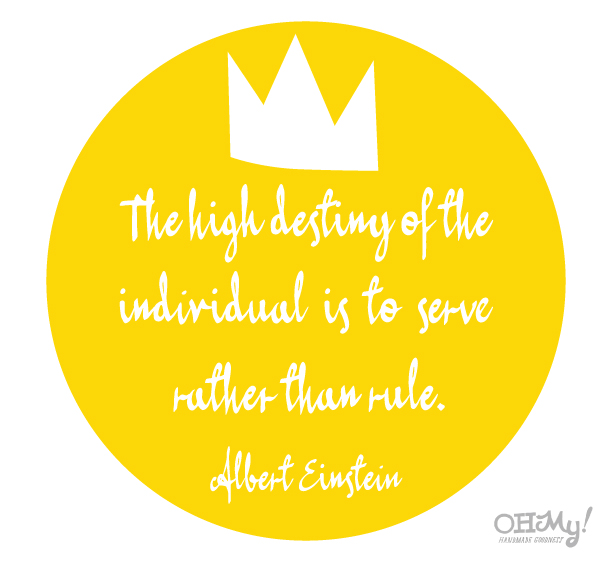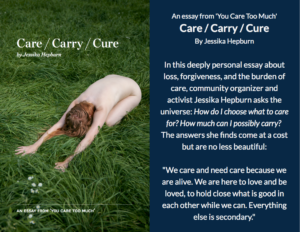
Click here to download a printable copy of Einstein’s quote!
One thing editing OMHG has taught me over and over again is that none of us know what we are doing but all of us can learn from each other along the way. I didn’t set out to turn OMHG into a community that was rooted in my ethics of social change and service. I had planned to keep my head down and market my own little handmade business, parent my girls, and support other makers. Eventually and organically my love of connection, diversity, and meeting creatives of all kinds took over and I drifted closer to the work of my heart instead of my hands. I never planned to be a public figure or have influence or thousands of followers. These things happened while I was busy making happy things and trying to make people happy not because I went looking for them! Last year I had the heart thumping realization that whether I liked it or not I had found myself in a leadership role and that I had to decide what that leading would look like. I had to find a way to fit my ethics into my entrepreneurship because running a business like the non-profits I love resulted in no stability for the future but the for-profit model didn’t feel right to me. How could I create a business based on being of service and social enterprise without selling programs and prescriptions or loosing our community focus? This thinking sent me back down the road of servant leadership and the core of my work in community development. I wanted to share my thinking with you all for ethics month and hear your own thoughts on these ideas!
SERVANT LEADERSHIP
“Servant leadership” is a term used by Robert K. Greenleaf to describe a timeless form of leadership (also known as ethical leadership and explored by many other thinkers) in The Servant as Leader published in 1970:
“A servant-leader focuses primarily on the growth and well-being of people and the communities to which they belong. While traditional leadership generally involves the accumulation and exercise of power by one at the “top of the pyramid,” servant leadership is different. The servant-leader shares power, puts the needs of others first and helps people develop and perform as highly as possible.”
Since I started editing OMHG I have noticed a shift in the online culture from one of mutual exploration to a landscape increasingly full of experts and leaders selling answers, plans, programs and outlines for following in their footsteps-with ever increasing price points. The language has also begun shifting from one of shared not-knowing to top down solutions from experts/celebrities. I have been finding myself missing the rawness of the internet and the wild west feel of exploring a fresh frontier (not here on OMHG but on the web in general). I love the vulnerability of us feeling our way together through an undiscovered continent and the sense of possibility this shared journey and equal footing offers. I sure don’t want to be an expert on anything, like the lovely Tara Swiger I prefer to be an explorer! The new online landscape seems to use a lot of “I” language and there is an explosion of personal branding stressing individual accomplishments over community achievement. It feels like a movement back towards top down/autocratic leadership instead of the spirit of collaboration and co-creation that I saw across the internet when I first started and that so inspired me. When we were working on the rebranding of OMHG I used these new sites and language as an example of what I hoped to avoid with our rebrand. I wanted the site to clearly say WE instead of ME.
When I worked with vulnerable communities and youth I was highly influenced by the concept of servant/ethical leadership. Thinkers and activists like Jean Vanier, Robert K. Greenleaf, bell hooks, and so many others helped guide my choices as a community advocate. The goal of my work was to have everyone leave an event or activity feeling like they were leaders with the skills and tools to create change. As a peer support leader for at risk inner city youth this was often the first time the youth had ever been encouraged to lead or recognize their own power was tied to being of service to others. Our own needs can become so all encompassing that we forget our security, value, and sense of self worth is usually determined by what we do for others instead of for ourselves. It was always so magical to watch angry and isolated young people grow into powerful leaders for positive change in their communities through helping other young people. I truly believe we are all leaders-no matter how timid and fearful we might appear-in fact I think the weaker we feel the stronger our ability to lead and reach others provided you can push past the fear to share your vulnerabilities. What unites us more consistently than our successes is our struggles-each of us is fumbling our way towards knowledge and not one of us has all the answers. This makes anyone and everyone qualified to lead (as long as they are doing it to serve others not just themselves!). I think this is why our #OMHG chats are consistently awesome-everyone participates and everyone is valued.
Realizing I am leading anything scares me because of the responsibility involved but it also lets me make some conscious choices about what kind of leader I want to be. Not everyone is going to dedicate themselves to being of service but all of us can choose to lift up each other as leaders, recognize our own impact, and make choices that improve our lives while supporting others. For those of you who also find yourself suddenly in a leadership role or wanting to step into one I wanted to share how the quest for ethical leadership helps keep me focused on strengthening the heart of what makes the internet awesome (connection, collaboration, creativity) and not be dazzled or defeated by what can make it awful (competition, celebrity, conflict).
The ten characteristics of servant leaders have been helpful in helping me understand my role as a leader and my place in helping to lift others up. These are the values that I am by no means accomplished at but they are traits I try to practice in business and life:
10 CHARACTERISTICS OF SERVANT LEADERSHIP
- Listening: To what is said & what is unsaid-servant leaders listen more then they talk and ask more then they answer
- Empathy: We never know someone fully or the battles they face in their darkest moments-servant leaders try to respect the stories of others and treat everyone with equal compassion and respect
- Healing: A servant leader tries to heal both themselves and others while helping people resolve conflict and struggle
- Awareness: Awareness of self, others, and the world so as to view situations holistically and find solutions to complex problems
- Persuasion: Instead of using power to coerce a servant leader offers information and knowledge to persuade
- Conceptualization: Looking beyond daily responsibilities or goals to create and peruse a long term vision
- Foresight: Looking ahead to the possible outcome of a situation and the impact on others before taking action
- Stewardship: Instead of owning or controlling servant leaders feel they hold their power/leadership in trust and are accountable to the whole and being of service to others instead of the ego.
- Commitment to growth of others: Servant leaders see their own growth as inseparable from the growth of others and are willing to invest in building capacity for their community first.
- Building community: Collaboration and community are at the core of servant leadership, when one does well so does the whole.
Growing up poor and with an intimate knowledge of being diverse in a system that often valued sameness I remember always being distrustful of power and people who covet or wield it. As a teen this led me to anger and wanting to break down the barriers I saw that kept people who are different from stepping into their own power. I was an early volunteer with Adbusters and campaigned to change how advertisers manipulate through design. I burned a 6 foot tall straw effigy of Ronald McDonald at the opening of a new McDonald’s (don’t hold it against me I was only 14!) with my Youth for Social Justice group. I advocated for women, children, teens, all through my own teens. I saw that when we worked together in a grassroots way we could make things better but for many years I fought for a better world from a place of sadness and anger at the way things are instead of working to build a better one with hope for the future. After I had my first daughter I started moving towards a gentler daily activism that was rooted in small acts of service instead of big acts of trying to save the world. This shift made my life richer and gave me the ability to affect more positive change then ever before. I didn’t have a term that fit until recently:
TEMPERED RADICALISM
Tempered radicals bear no banners; they sound no trumpets. Their ends are sweeping, but their means are mundane. They are firm in their commitments, yet flexible in the ways they fulfil them. Their actions may be small but can spread like a virus. They yearn for rapid change but trust in patience. They often work individually yet pull people together. Instead of stridently pressing their agendas, they start conversations. Rather than battling powerful foes, they seek powerful friends. And in the face of setbacks, they keep going. To do all this tempered radicals understand revolutionary change for what it is-a phenomenon that can occur suddenly but more often than not requires time, commitment, and the patience to endure.” Debra E Meyerson, Radical Change, The Quiet Way Harvard Business Review
I believe our creative community is revolutionary and changing rapidly and that all of us are a part of this change. I would love to see an online world where we increasingly feel confident as leaders and take action together in big and small ways to address issues and find solutions together instead of following the lead of the few. I’ve invested my heart in building our creative community where no one is an expert and all of us are equals, through trial and error our new site should be financially and ethically sustainable. I hope this place is one where all of us feel empowered to lead and share knowledge. A place that is truly ours not just in words but in actions-where we can be of service to each other as we lead the way, hand in hand, slowly, carefully, together.
No matter what size your business, or dream, or ability, you can be a leader and create positive meaningful change by being of service to others. Whether that takes the form of going out of your way to have your customers leave feeling loved and encouraged or dishing up soup in your local shelter with a few business friends or offering a hand to someone in need. These small radical acts of leadership and compassion are cumulative and I believe are the surest way to change the world and our lives for the better.
I would love to know: how are you leading or serving in your community (on & offline)? What leaders inspire you to feel like a leader too? What characteristics of servant leadership do you practice or want to practice? Your thoughts and feelings on the changing online world, tempered radicals, being of service & the ethics of leadership!

